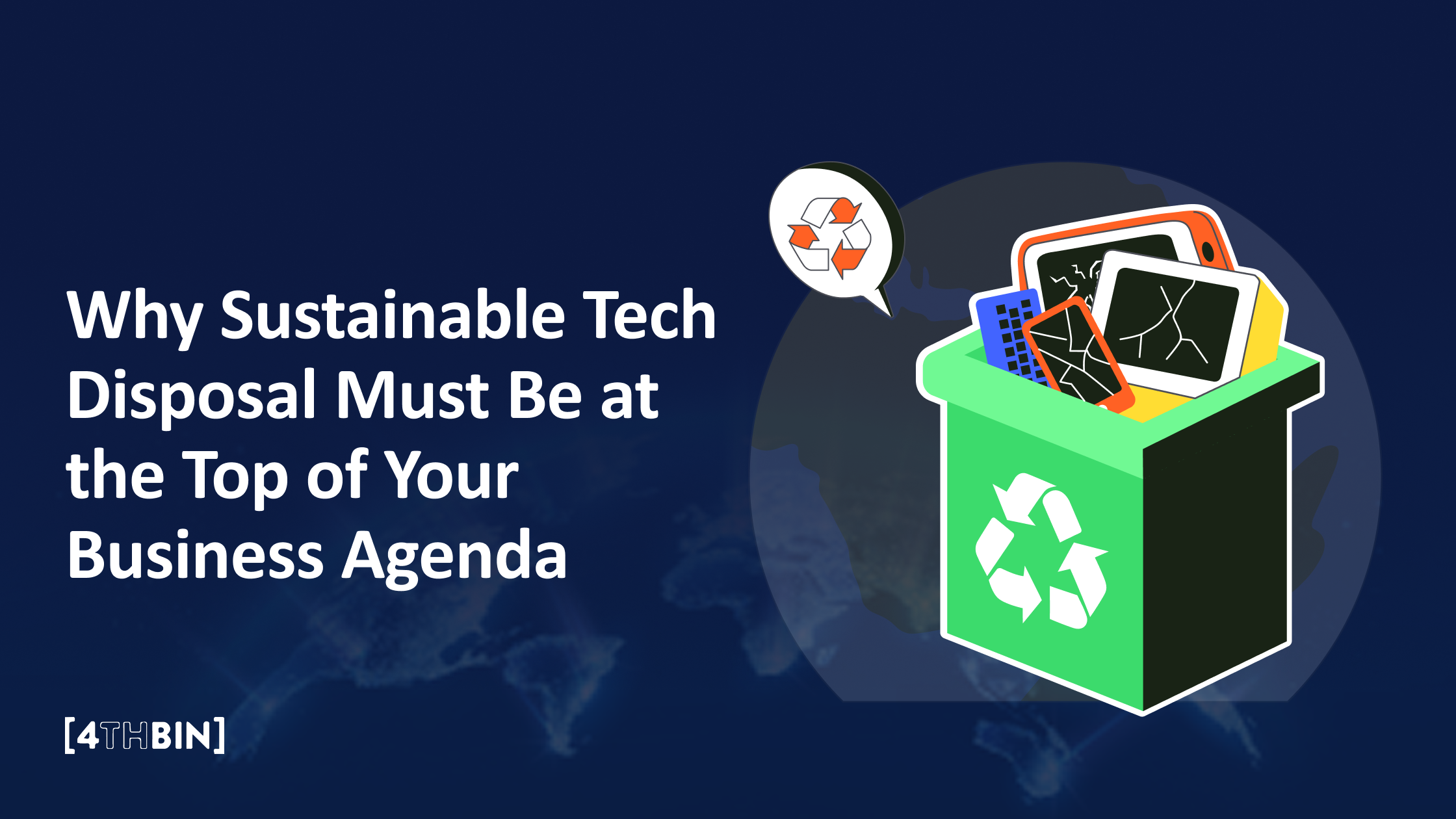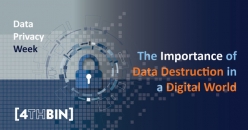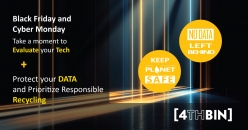The Impact of Sustainability in Business & What Most Companies Overlook
Sustainability is no longer just a trend or a talking point. It’s become a core expectation for how businesses operate and grow.
People across the board—investors, customers, regulators, and employees—are paying close attention to how companies manage their impact. But while many organizations focus on emissions, supply chains, or packaging, one piece of the sustainability puzzle is often overlooked: what happens to old tech?
Outdated devices—laptops, servers, phones—tend to pile up quietly, but they represent serious environmental and business risks. And if they’re not part of your sustainability plan, you’re missing a significant opportunity to reduce harm, increase efficiency, and build trust.
This blog explores sustainability in a modern business context and why your e-waste strategy matters more than you might think.
The Three Pillars of Business Sustainability

You need more than a few green initiatives to build a sustainable business. Your business needs a strategy that considers the environmental, social, and economic impacts of everything you do. Here are the three core pillars of sustainability:
Environmental Sustainability
Most sustainability conversations begin here, and for good reason. Environmental sustainability means reducing your company’s negative impact on the planet. That includes cutting emissions, minimizing waste, and using natural resources responsibly.
But here’s where many businesses fall short: while focusing on packaging or energy consumption, they overlook the digital waste they produce. Electronics contain hazardous materials like lead, mercury, and flame retardants. When improperly disposed of, these toxins leach into soil and water, damaging ecosystems and public health.
Every unused server or abandoned hard drive represents more than clutter; it’s a missed opportunity to reduce harm and recover value through responsible recycling.
Social Sustainability
This pillar is about people—inside your organization and beyond. It includes ethical labor practices, workplace well-being, and community impact.
E-waste has a hidden social cost. Much of it is in developing countries where informal recycling methods put workers and local communities at risk. Toxic fumes from burning cables or dismantled circuit boards aren’t just environmental hazards but serious health threats.
By ensuring your business partners with certified e-waste recyclers, you can help break this cycle. Responsible disposal supports safer working conditions, protects vulnerable communities, and aligns with your social impact goals.
Economic Sustainability
Finally, sustainability must make financial sense. Economic sustainability is building long-term resilience through efficiency, innovation, and risk management.
When tech assets are retired improperly, the costs add up. There’s the risk of non-compliance with environmental regulations, exposure to data breaches, and the financial burden of wasteful practices. Conversely, companies that adopt sustainable practices often lower operating costs, improve stakeholder confidence, and open the door to green funding and incentives.
The Missing Link in Most Sustainability Strategies: E-Waste
Ask most businesses about their sustainability initiatives, and you’ll hear about energy-efficient buildings, hybrid work policies, carbon offsets, and maybe even a shift to digital communication. However, one area rarely gets the attention it deserves: electronic waste.
Yet, e-waste is one of the fastest-growing waste streams in the world.
Every device your business buys—laptops, monitors, servers, smartphones—eventually reaches the end of its life. Multiply that across departments, locations, and years of upgrades, and the footprint is staggering. What happens to those devices when they’re no longer in use?
The answer is troubling for many companies: they’re stored, forgotten, or discarded without proper oversight. This leads to significant issues like:
Environmental Risk
Electronics contain heavy metals and toxic materials that can contaminate landfills, water sources, and air when improperly disposed of. Although e-waste makes up only 2% of trash in landfills, it contributes to nearly 70% of the toxic waste. Businesses that don’t manage this waste responsibly directly contribute to a growing environmental crisis.
Data Security Threats
Old devices often hold sensitive company data even if they’re “wiped.” Hard drives, SSDs, and mobile devices can still be recovered if not properly destroyed. For regulated industries or companies managing customer information, improper disposal isn’t just risky; it can lead to compliance violations. One data breach from a discarded device can cost millions in fines and reputation damage.
Regulatory & Reputational Risk
Cities, states, and countries are enacting stricter e-waste laws. From GDPR in the EU to R2v3 certification standards in the U.S., the pressure to comply is rising. Businesses that fail to meet these standards could face legal action or fines.
Non-compliance can result in fines, legal consequences, or blocked contracts. But even when not mandated, failure to act responsibly damages brand trust. Customers, employees, and investors increasingly expect transparency and ethical handling of tech waste.
The bottom line is that e-waste management isn’t a back-office IT issue—it’s a sustainability and risk management priority. Companies that get this right are future-ready, while those that ignore it are not.
Why Sustainable Businesses Outperform
Sustainability isn’t just about meeting climate goals or satisfying compliance checklists—it’s a competitive advantage. Companies that prioritize sustainability often find that they’re making smarter decisions for their business. Here’s how a well-executed sustainability strategy can drive better performance across the board:
Lower Operating Costs
Sustainable operations often lead to leaner operations. By reducing energy consumption, minimizing waste, or optimizing resource use, businesses that adopt sustainable practices tend to cut costs over time. Even something as simple as managing your e-waste responsibly—partnering with a certified recycler instead of storing or scrapping old tech—can reduce storage expenses, streamline operations, and recover value through reuse or resale.
Reduced Regulatory & Legal Risks
Governments are tightening environmental laws, and non-compliance can be costly. Sustainability-focused companies stay ahead of regulations, rather than scrambling to adapt after penalties or investigations arise. Proper handling of electronic waste, for example, helps businesses remain compliant with evolving e-waste laws, data privacy regulations, and sustainability reporting frameworks. This reduces exposure and demonstrates operational maturity to stakeholders.
Greater Appeal to Investors & Customers
Today’s customers, partners, and investors want to work with businesses that align with their values. Companies that take a stand on sustainability—and back it up with action—are seen as more trustworthy, transparent, and forward-thinking. When your business can point to responsible e-waste practices, environmental certifications, and a clear sustainability roadmap, it’s not just good PR—it’s a signal of long-term commitment and credibility.
Access to ESG Investment
Sustainable companies are increasingly attractive to investors, particularly those focused on ESG (Environmental, Social, and Governance) criteria. Many procurement processes now include sustainability requirements, and green financing options are opening up for businesses that meet specific standards. By addressing areas like e-waste, your business is reducing harm and improving access to growth capital and partnership opportunities.
Higher Employee Engagement & Retention
People want to work for companies that care. Sustainability isn’t just a customer-facing initiative—it resonates deeply with employees, especially younger generations actively seeking purpose-driven workplaces. Having clear sustainability goals, including a plan for reducing e-waste and minimizing environmental impact, helps you attract and retain talent that values responsibility and innovation.
When sustainability is built into how you operate, not just how you talk, it makes your business more resilient, trusted, and prepared for what’s next.
How to Build a Sustainable Business Strategy?

Building a sustainable business isn’t about doing one or two “green” things—it’s about creating a framework that supports long-term environmental, social, and financial responsibility across everything you do.
Whether you’re just getting started or looking to strengthen your approach, here are a few practical ways to turn sustainability into a meaningful, measurable part of your business strategy:
Start with a Sustainability Audit
Before making real progress, you need a clear picture of your business’s current state. This means examining your complete operational footprint—not just your energy usage or office practices, but also your supply chain, procurement habits, logistics, and technology lifecycle.
For most companies, e-waste is a blind spot—old devices are stored indefinitely or discarded without a plan. A proper audit can help you identify inefficiencies that quietly drive up costs or waste and uncover hidden risks, like outdated IT assets sitting in storage with sensitive data.
It also helps your business prioritize areas where sustainability improvements can deliver the highest ROI and gives you a solid foundation for setting data-based sustainability goals.
Set Actionable Goals
Once you know where you stand, you can start defining where you want to go. But these goals must go beyond broad statements like “we want to be greener.” They should be specific, measurable, and tied directly to your business operations.
That might include reducing energy consumption, diverting tech waste from landfills, or working only with certified recycling partners. Aligning sustainability targets with compliance requirements, cost efficiencies, and operational outcomes makes them easier to implement and justify to stakeholders.
Choose the Right Partners
No sustainability strategy can succeed in isolation. The vendors and service providers you work with directly impact whether you meet your goals or fall short. Whether it’s your logistics provider, packaging supplier, or e-waste recycling partner, you must ensure they follow industry-recognized standards and provide transparency around their practices.
For example, partnering with a certified e-waste recycling company helps reduce your environmental footprint, protect your data, and support your reporting requirements. Choosing the right partners removes friction from your sustainability efforts and protects your brand.
Engage Your Team
For sustainability to stick, it needs to be embraced across your organization, not just driven from the top. That means engaging employees in the “why” behind your strategy and giving them opportunities to contribute in practical ways. This could be through awareness campaigns, green team initiatives, or employee-driven ideas for reducing waste and energy use. When sustainability becomes part of your culture, it shows up in the small day-to-day decisions that collectively make a significant impact. More importantly, it signals to your team that this isn’t just a box to check—it’s a shared responsibility.
Measure Progress & Report Transparently
A sustainable strategy should evolve with your business. That means regularly measuring your impact, reviewing your performance, and adapting your approach as regulations, technologies, and expectations change. Internal and external reporting progress demonstrates transparency and helps build trust with clients, investors, and regulators.
It also creates accountability, helping you stay focused on long-term results instead of short-term wins. When sustainability is treated like any other core business priority—with clear metrics, regular reviews, and leadership oversight—it becomes a competitive advantage, not a compliance task.
Why End-of-Life Tech Decisions Matter More Than You Think
In many organizations, technology upgrades happen like clockwork, but what happens to the replaced devices often goes unaddressed. Outdated laptops, servers, hard drives, and other electronics quietly accumulate in storage rooms or are discarded without a clear plan. These decisions—or lack of them—can quietly undermine your broader sustainability goals.
Tech disposal isn’t just an operational task. It has real implications for your environmental impact, data security, and compliance with regulations. Simply keeping unused equipment increases storage costs and liability, while improper disposal creates ecological and reputational risks.
Taking responsibility for the end-of-life phase of your tech assets is a crucial step toward building a more sustainable business. It shows that your company isn’t just investing in new tools, but also thinking about managing them responsibly from start to finish. Partnering with a certified recycling provider ensures your retired devices are handled in a way that meets both environmental standards and data protection requirements.
Responsible tech disposal supports the shift from a linear model—use, discard, replace—to a circular one, where materials are reused, repurposed, or safely recycled. It's not just about reducing waste; it’s about creating a more innovative and thoughtful approach to how your business consumes technology.
Elevate Your Sustainability Standards with 4THBIN
Building a sustainable business starts with seeing the whole picture. That includes the forgotten laptops in storage, the servers past their prime, and the IT assets quietly holding sensitive data.
With 4THBIN ’s e-recycling solutions, businesses can be assured of secure, compliant, and environmentally responsible electronic waste disposal.
With over a decade of experience, 4THBIN has partnered with more than 10,000 organizations, including Fortune 100 companies and small businesses, to transform e-waste challenges into opportunities. We make the process seamless, offering businesses a way to turn a potential liability into an opportunity for leadership in sustainability and responsibility.
Our certified data destruction services ensure that sensitive information is completely safeguarded, eliminating the risks of data recovery associated with improper disposal. From secure RemoteReturn mail-in options to convenient on-site collection, our customizable solutions allow you to choose the plan that best suits your organization’s needs.












